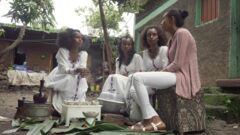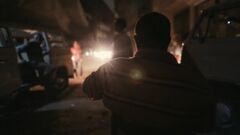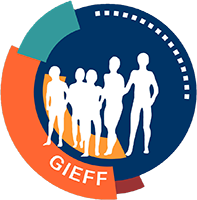13-05-2020 GIEFF-Films
Student Film Festival
Trabolsi, Artemio, Ghost Tape # 10, Motels, Warehouse, To Make a Crossing, Ascona, Coleum, Lukomir, My Home, February 27th, Da Hillsook Wedeen, Strangers
Discussions online: morning, afternoon, evening

Trabolsi
Germany, 2019, 60 min / Original languages: English, Arabic
Location: Lebanon, Tripoli
A Film by: Ina Schebler
“Tripoli is a tired city, it’s an exhausted city, it’s a beautiful, exhausted city” says Khalid, who together with his friends Mariam and Nazih navigate their lives through a marginalized city. They aspire to overcome the struggles of history and shape the future of a city they love.

Artemio
Mexico , 2017, 48 min / Original language: Spanish
Location: Mexico
A Film by: Sandra Luz López Barroso
Artemio was born in the U.S.A. Now he lives in a small town in Guerrero with his mother and his new family. Although his roots are in Mexico, he still does not feel a part of it. Together, they will show us a reality in which the distance from those they left behind will come to life in every phone call. “Artemio” was created as part of the filmmaker’s thesis at the Centro de Capacitación Cinematográfica in Mexico City.

Lost Boy
Germany , 2019, 15 min / Original languages: Burmese
Location: Myanmar
A Film by: Shin Thandar
Thant Zin came to Yangon with his brother around three years ago. He may have been twelve years old at the time, but he cannot really remember. After finding him a job at a car wash, his brother returned to their village, leaving Thant Zin behind. He has not been back since. Deeply unhappy in his badly paid job, and fed up with sleeping under a torn mosquito net in a dark and dingy room, Thant longs to go home – but he doesn’t remember where his village is, or even what it is called. A sensitively filmed short documentary about a boy trying to cope with loneliness and abandonment – a fate shared by many children and young adults migrating from rural Myanmar to the city in search of work and a better life.

Emails to My Little Sister
Germany, 2018, 35 min / Original languages: Amharic
Location: Ethiopia, Bahir Dar; Germany, Berlin
A Film by: Solomon Mekonen
“Emails to My Little Sister” is an auto-ethnographic film based on the filmmaker’s academic research of “becoming black” in Berlin. In email conversations with his sister back in Ethiopia, he reflects upon his own experience in Germany and how it changes his perception of being black. Slowly, the difference between the two countries and their effects on the siblings’ lives come to the fore. The film was created as part of a Masters thesis project concerning the phenomenology of Blackness in Berlin.

Ghost Tape # 10
USA, 2018, 28 min / Original languages: English, Vietnamese
Location: Vietnam; USA
A Film by: Sean David Christensen
Created by the U.S. Army during the Vietnam War, “Ghost Tape 10” was one of many audio tapes engineered to psychologically intimidate and demoralize North Vietnamese soldiers. These audio tapes would echo throughout war zones, their soundtracks consisting of actors portraying grieving family members, or voices from the dead, longing to be reunited with their loved ones. By re-examining this weaponization of belief through the context of modern day Vietnamese and Vietnamese-American religious practice, reactions to this artifact of American propaganda lead to discussions of relationships between the living and the dead. What truths, if any, still echo within this recording?
Discussion Wednesday morning
Participants: Ina Schebler, Shin Thandar, Solomon Mekonen, Sean David Christensen
Moderation: Franzi Weidle

Motels
USA, 2019, 27,5 min / Original languages: Spanish
Location: Colombia
A Film by: Claudia F. Quigua
The film “Motel” explores a prominent yet often overlooked aspect of Colombian culture through the memories and experiences of motel guests. By capturing these spaces, the filmmaker’s aim is to characterize them, understand their organization and the types of practices that take place in them, and identify the relationship to themes of sexuality and gender in the urban landscape.

Warehouse
Greece, 2018, 8 min / Original languages: No Dialogue
Location: Germany, Berlin
A Film by: Constantinos Diamantis, Lillian Dam Bracia, Malwa Grabowska, S. Buse Yildirim
In this meditative ethnographic short film, the warehouse is portrayed as a place where sound moves objects. It is an intimate encounter with the labor of a carpenter within the cosmos of objects, sounds and textures. Every trace of sound in every bit of object can be seen as an individual within a space. Here, every material has its own texture, smell and acoustic properties. The array of sounds and images confronts audiences with the aural and visual textures of carpentry and the space itself. The film guides them into a sensory experience through the up-close, intense sonic and visual engagement and an imaginative soundscape.
See biographies Constantinos Diamantis, Lillian Dam Bracia, Malwa Grabowska, S. Buse Yildirim

To Make a Crossing
Great Britain, 2018, 12,5 min / Original languages: English
Location: Great Britain, Wales
A Film by: María Casas Castillo, Evan DesRosiers
In the remote hills of central Wales, the Devil's Bridge presents three periods of local history. Its legend, shared by bridges around the world, blends the demands of tourism with the magic of a landscape. “To Make a Crossing” is an anthropological film project about time, travel, and folklore, in which three locals take us on a journey through the origin and the future of the bridge and its stories.

Ascona
Germany, 2019, 15 min / Original languages: English
Location: Germany
A Film by: Julius Dommer
“Ascona” shows a place that seems to have fallen out of time. A place that has not changed since the 1950s but still exists. A miniature golf course becomes an analogy for social analysis. On the basis of observations of a golf course in Bad Oldesloe, the film analyzes the history and societal importance of a sport that is now on the brink of extinction. Reflecing on the conservatism of the 1950’s, “Ascona” presents protagonists who – in a dry North German humour – describe the beginnings and difficulties of the golf course as a site for a fun time activity as well as an elite sport.

Coleum
France, 2020, 30 min / Original languages: French, Corse
Location: France, Corse
A Film by: Coralie Seignard
Three pigs are taken to the slaughterhouse by the man. Once they are dead, their meat is carved by the man and his son. The grandson observes the scene.
Discussion Wednesday afternoon
Participants: Claudia F. Quigua, Constantinos Diamantis, Lillian Dam Bracia, Malwa Grabowska, S. Buse Yildirim, María Casas Castillo,Julius Dommer, Coralie Seignard
Moderation: Martin Gruber

Lukomir, My Home
Slovenia, 2018, 61 min / Original languages: Bosnian
Location: Bosnia and Herzegovina, Lukomir
A Film by: Manca Filak, Žiga Gorišek
Lukomir is the village with the highest altitude (1472 m above sea level) in the Federation of Bosnia and Herzegovina. Despite the decrease in population and the increase in tourism throughout the last decades, transhumant pastoralism remains one of the main types of economy in the villages of Bjelašnica. Transhumance and seasonal migration of families and their flocks of sheep characterize the life of their residents. Shot between April 2014 and May 2017, “Lukomir, My Home” is an ethnographic film that potrays an older couple’s everyday life. The filmmakers accompany the couple while they carry out most of their everyday chores, release the sheep into the valley and eventually return to Lukomir.

February 27th
Germany, 2018, 43 min / Original languages: Hassaniya
Location: Algeria, Sahara
A Film by: Marie-Thérèse Jakoubek
A desert city in the middle of the Western Sahara: the camp “February 27th”. Initially created as a makeshift solution, it has turned into a permanent settlement since the Moroccan annexation in 1976. For 42 years, around 210.000 Saharawi have been living in camps like this in the Algerian desert, waiting for a referendum on independence. Slowly, the camera approches this place and its history in various scenes: women tell the story of how they sew the first tents from their clothes, a camel is being loaded onto a pick-up, a tea ceremony. “February 27th” shows the life in a temporary existence that evolved into a permanent home against people’s will and to this day symbolizes their resistance and resilience.

Da Hillsook Wedeen
Great Britain, 2018, 16,5 min / Original languages: English
Location: Great Britain, Shetland Islands
A Film by: Hope Strickland
Shetland is a place of wild, unforgiving landscapes, supernatural beliefs and a soundscape barely altered over time. The ethnographic film explores storytelling and social imagination in Shetland. The folklore tale, Da Hillsook Wedeen, has a timeless quality: unfolding from historical trauma forward through generations of women’s voices. What does it mean to be a woman left on the shore? “Da Hillsook Wedeen” was completed as part of the Masters course in Visual Anthropology at The University of Manchester and has been screened at a variety of anthropological film festivals including the Society for Visual Anthropology Film and Media Festival (SVAFMF) and the Nordic Anthropological Film Association Festival (NAFA).

Flox
Egypt, 2019, 45,5 min / Original languages: Arabic
Location: Egypt
A Film by: Hady Mahmoud
Inspired by the everyday struggle of micro-bus drivers in Cairo, “Flox”, the title of this film and the name of the micro-bus as pronounced by its drivers, is an observational documentary that looks at the intricate interplay between class and gender. Specifically, it explores how micro-bus drivers perceive and negotiate their masculinity in a mega-city like Cairo. For them, driving a difficult vehicle, handling inter-group conflict, struggling with poverty and substance abuse only made them wish not to see their children inherit the same job. The film is about the beauty as well as the dark side of the chaotic life of the urban poor who are forced to create a state within a state in order to survive.

Strangers
Germany, 2019, 75 min / Original languages: No dialogue
Location: India, Kolkata
A Film by: Laura Kansy, Oskar Zoche
Four strangers whose paths would never cross in real life enter into a cinematic dialogue in this intimate portrait of an Indian society in turbulent times. As a Muslim, Jiaul strives for mutual respect and equality of religious minorities, while Ram, member of the highest Hindu caste but still living in poverty, is eager to uphold traditional Hindu values. In his lovesickness, the homeless drug dealer Manoj finds distraction from his daily struggle for survival, while the young student Tashi has difficulties coming to terms with her role as a woman in Indian society. The sudden demonetization plunges the whole country into chaos. Which social attributes determine whose word is heard and whose not?
See biography Laura Kansy and Oskar Zoche
Discussion Wednesday evening
Participants: Manca Filak, Žiga Gorišek, Marie-Thérèse Jakoubek, Hope Strickland, Hady Mahmoud, Laura Kansy, Oskar Zoche
Moderation: Matjaz Pinter, Marlene Schlichtenhorst
